![]()
![]()
The Vibration Meter Data Logger – VSEW_mk4 – 8g is a new model in the VSE series of smart vibration dataloggers. It can record accelerations, vibrations, velocities and inclinations. It includes a 3-axis MEMS accelerometer, an accurate date/time clock and a non-volatile 128 Mb recording memory. Depending on the settings it can record acceleration or velocity signals and/or RMS levels for months. Its very small size allows it to be attached to, or embedded within, the monitored equipment.
The Vibration Meter Data Logger – VSEW_mk4 – 8g model is an evolution of the VSEW_mk2– 8g model.
The Vibration Meter Data Logger – VSEW_mk4 – 8g is a new model in the VSE series of smart vibration dataloggers. It can record accelerations, vibrations, velocities and inclinations. It includes a 3-axis MEMS accelerometer, an accurate date/time clock and a non-volatile 128 Mb recording memory. Depending on the settings it can record acceleration or velocity signals and/or RMS levels for months. Its very small size allows it to be attached to, or embedded within, the monitored equipment.
The Vibration Meter Data Logger – VSEW_mk4 – 8g model is an evolution of the VSEW_mk2– 8g model.
| Number of axes | 3 |
|---|---|
| Acceleration Sensor | MEMS Digital 3-axes |
| Dynamic Range | +-8 g |
| Bandwidth High Limit | Adjustable up to 2 kHz (@ 4 kHz Sampling Rate) |
| Bandwidth Low Limit | DC (High-Pass Filter Bypass), Adjustable from 10 mHz to Fs/2 (High-Pass Filter On) |
| Acceleration Noise X-Y Axes (Typical) | Note: Acceleration noise is primarily affected by the sampling rate. The higher the sampling rate, the higher the noise., 110 μg RMS @ 125 Hz Sampling Rate, 750 μg RMS @ 4 kHz Sampling Rate |
| Acceleration Noise Z Axis (Typical) | Note: Acceleration noise is primarily affected by the sampling rate. The higher the sampling rate, the higher the noise., 110 μg RMS @ 125 Hz Sampling Rate, 750 μg RMS @ 4 kHz Sampling Rate |
| Velocity Noise X-Y Axes (Typical) | Note: Velocity noise is primarily affected by the high-pass cutoff frequency. The lower the cutoff frequency, the higher the noise., 25 μm/s RMS @ 1 Hz High-Pass Cutoff, 8 μm/s RMS @ 10 Hz High-Pass Cutoff |
| Velocity Noise Z Axis (Typical) | Note: Velocity noise is primarily affected by the high-pass cutoff frequency. The lower the cutoff frequency, the higher the noise., 30 μm/s RMS @ 1 Hz High-Pass Cutoff, 10 μm/s RMS @ 10 Hz High-Pass Cutoff |
| Inclination Angle Noise | Note: Measured using acceleration average, with a log interval of 1s, with the instrument positioned with the Z axis vertical, and X and Y axes horizontal, 1 E − 3° |
| Inclination Angle Temperature Stability | Note: Measured using acceleration average, with a log interval of 1s, with the instrument positioned with the Z axis vertical, and X and Y axes horizontal, 0.2° over the temperature range -20 °C to 60 °C |
| Connectivity | USB (Virtual Com port interface with open protocol), WiFi (“W” Model only) |
| Radio Standard | IEEE 802.11 b/g/n |
| Radio Certification | FCC, IC, Japan, Korea, CE |
| Measurements | Raw Acceleration (g or m/s2), Raw Velocity (m/s), Min, Max and Avg Acceleration values (g or m/s2), Min, Max and Avg Velocity values (m/s), Inclinations, Min, Max and Avg RMS Vibration level (linear or dB, g or m/s2), Min, Max and Avg RMS Velocity level (linear or dB, m/s) |
| Alarm Emails | Acceleration Signal Threshold (X, Y, Z axis), Velocity Signal Threshold (X, Y, Z axis), RMS Acceleration Level Threshold (X, Y, Z axis), RMS Velocity Level Threshold (X, Y, Z axis), Battery |
| Duty Rate of Signal Capture | 100% – No Missed Samples |
| Spectral Display | 3-Axes 1024-point Power Spectrum – dB or Lin Scale |
| Modes of Operation | Idle (Micro-Power), USB-Connected (Active), Recording (Stand-alone), Auto-Rec – Stand-Alone (Idle when no activity / Recording while activity is present) |
| Sampling Clock Accuracy | 1% |
| Date-Time Clock Accuracy | 30ppm |
| Calibration | Self-Calibration using the earth's gravity as a reference |
| Battery Type | Integral Li-Poly – USB-Rechargeable |
| Recharge Time | 2 h 30 (Typical) |
| Battery Autonomy (Full-Charge) | Up to one year while in Idle, 16 days to 125 days while recording, depending on settings |
| Battery Life | > 300 Charge/Discharge Cycles |
| Temperature Range | -20°C to 60°C (-4°F to 140°F) |
| Recording Memory | Non-Volatile Flash Memory |
| Recording Memory Capacity | 128 Mb, (Ex: can continuously record single-axis raw signals for 17 min @ 4 kHz Sampling Rate), (Ex: can continuously record 3-axes full-statistics levels at 1s intervals for 5 days), (Ex: can continuously record 3-axes full statistics levels a 1min intervals for 10 months.) |
| Recording/Erasure Cycles | Greater than 100 000 |
| Data Retention | Greater than 20 Years |
| Dimensions | 7.62 x 3.94 x 2.06 cm, (3” x 1.55” x 0.81”) |
| Weight | 65 g |
| Construction | Integrally Potted Weather-Proof ABS Enclosure |
| Ingress Protection (IP) Rating | IP57: Protected against dust and temporary immersion in water |
574.00 $
Change Currency
In stock (can be backordered)
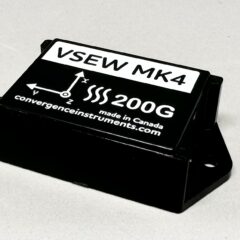
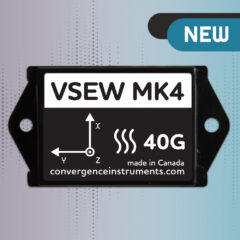
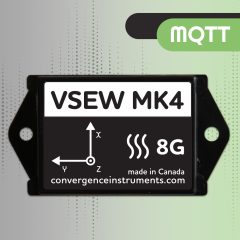


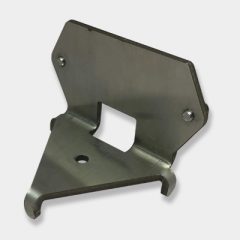
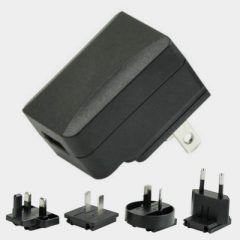
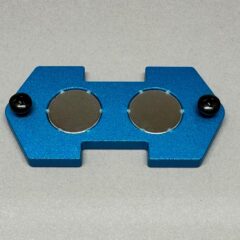
Convergence Instruments 2024 © All Rights Reserved | Privacy Policy and User Agreement | Terms and Conditions | Limited Warranty
| VSEW_mk4-200g | VS_E-16g | VSEW_mk4-8g | VSEW_mk4-40g | mk4 MQTT Variants | |
|---|---|---|---|---|---|
| Memory | 128 Mb | 128 Mb | 128 Mb | 128 Mb | 128 Mb |
| Dynamic Range | +-200g | +-16g | +-8g | +-40g | depends on model (DoM) |
| Measures Velocity | * | * | * | * | |
| Open USB protocol | * | * | * | * | |
| WiFi Reporting | * | * | * | * | |
| Email Alarms | * | * | * | ||
| Visual Alarms | * | ||||
| Timer Start | * | * | * | * | * |
| High-Precision Trigger with Guaranteed 80 ms Pretrig | * | * | * | * | * |
| Time Zone Aware | * | * | * | * | * |
| Retains Settings Through Reset or Battery Failure | * | * | * | * | * |
| Target Application: | |||||
| Impacts | * | DoM | |||
| Shipment Monitoring | * | * | * | DoM | |
| Inclinometer | * | * | DoM | ||
| Low-Amplitude Vibrations | * | DoM | |||
| Ground Vibrations/Construction | * | DoM | |||
| DIN4150-2 | * | DoM | |||
| Machine Monitoring | * | * | * | DoM | |
| Raw-Signal Recording | * | * | * | * | * | Noise Floor X-Y Axes | 31 mgRMS @ 100Hz 125 mgRMS @ 3.2 kHz |
2 mgRMS @ 100Hz 10 mgRMS @ 3.2 kHz |
110 μgRMS @ 125Hz 750 μgRMS @ 4 kHz |
800 μgRMS @ 125Hz 4 mgRMS @ 4 kHz |
DoM |
| Noise Floor Z axis | 36 mgRMS @ 100Hz 160 mgRMS @ 3.2 kHz |
3.6 mgRMS @ 100Hz 16 mgRMS @ 3.2 kHz |
140 μgRMS @ 125Hz 900 μgRMS @ 4 kHz |
800 μgRMS @ 125Hz 4 mgRMS @ 4 kHz |
DoM |
ENGLISH VERSION
VERSION FRANÇAISE
Ask us here.